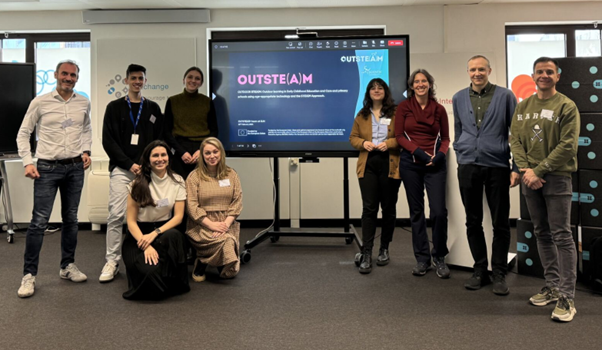CASTeL members were recently in Brussels for the kickoff meeting of the exciting OUTSTE(A)M project. The project brings together partners from Ireland (Dublin City University), Belgium (European Schoolnet), Spain (Asociacion De Investigacion De La Industria Del Juguete Conexas Y Afine), and the Netherlands (Stichting International Child Development Initiatives) to explore innovative pedagogies that will allow young children to engage with STEAM in outdoor environments. The project is being led from DCU by principal investigator Assistant Professor of Early Childhood Education Sandra O’Neill. The team includes Dr Eamon Costello, Professor Hamsa Venkat, Dr Orla Kelly and Dr Anne Mc Morrough.
The project seeks to ensure that more attention is paid to STE(A)M education in early childhood education and care (ECEC) and primary schools. STE(A)M teaching is an interdisciplinary approach to learning that can be easily adapted to ECEC and primary curriculums. For younger learners, there is usually no strict timetable divided into subjects, but rather learning moments that happen all the time. STEM experiences can be planned or unplanned and teachers can discover opportunities in everyday activities and through play-based learning. As early as two years old, children are exposed to gender role stereotypes and biased ideas about the science and mathematics performance of girls and boys. These preconceptions in primary education and even ECEC show how early interventions on role models of STEM professionals are needed.
The OUTSTE(A)M project will develop a toolkit for ECEC and primary educators to teach sustainability in outdoor settings using a STE(A)M approach with the support of age-appropriate technology. The toolkit will be tested with teachers, their students, and families in different countries, and improved. OUTSTE(A)M will produce a set of guidelines on how to integrate the toolkit in ECEC and primary schools, as well as recommendations for policymakers. To communicate these results, and engage and train teachers, a MOOC will be developed and a competition will follow, from which best practices will be gathered. The project’s last activity will be an international dissemination workshop in Belgium, where winners from the competition will be invited.
